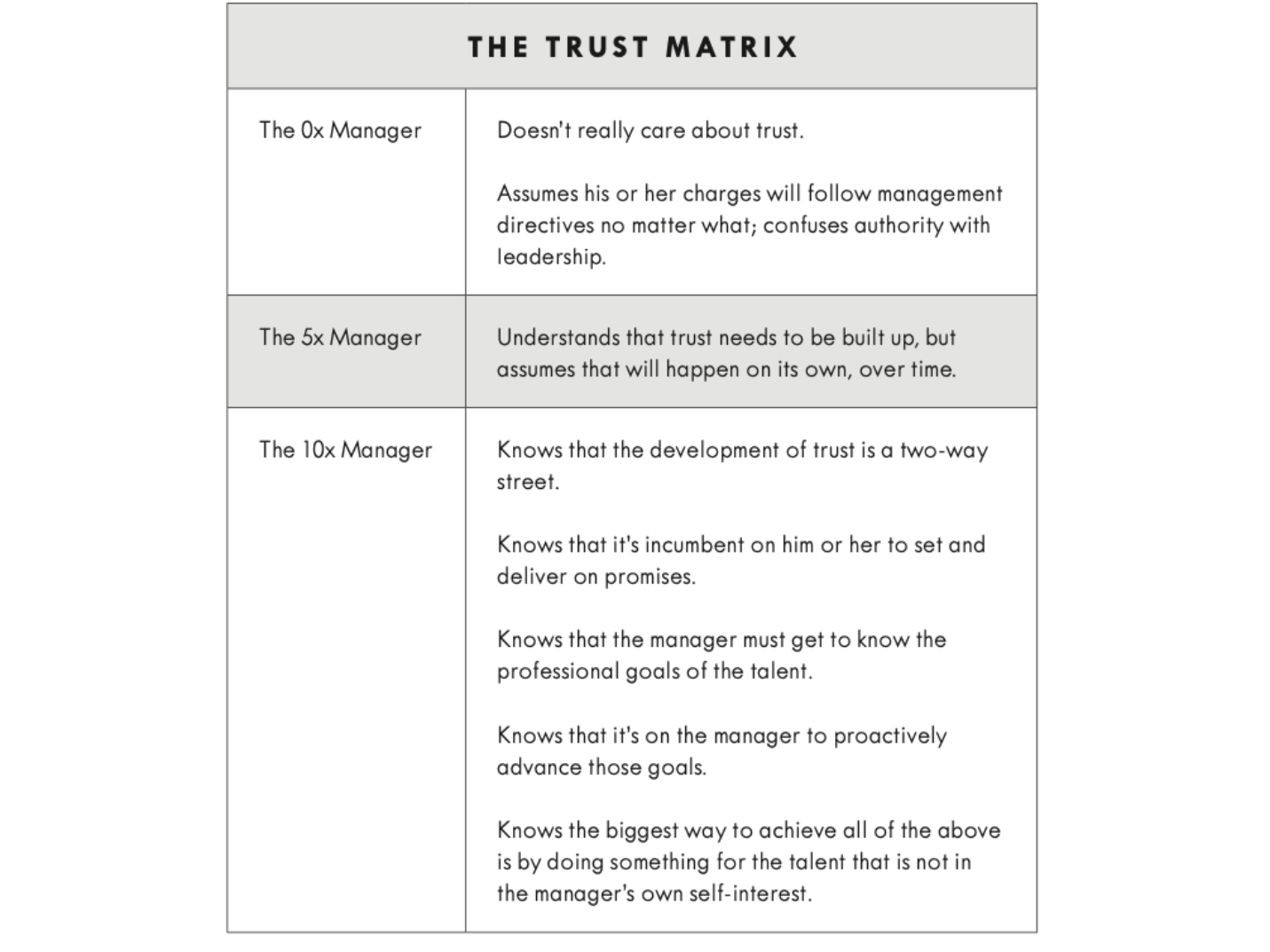Drawing comparisons between Ted’s leadership approach and what we’ve come to call “10x” style management

For anyone who has had the good fortune to see Apple TV’s hit show, Ted Lasso, it might come as little surprise that we felt inspired to write this post. Delivering an authentic “feel good” spirit in nearly every episode, the show resonates widely at a time when many of us particularly appreciate a consistent source of pick-me-up content.
While the sports comedy series is a fantastic binge-watch that keeps you excited for Ted’s next moment of optimistic charm, such a description sells it short. Some worthwhile life lessons exist just a level deeper, whether you’re looking to be inspired as a friend, partner, or business leader. There’s no shortage of audiences who might benefit from the show’s most notable takeaways.
As a tech talent management firm, we naturally saw some similarities between Ted’s leadership style and what we’ve come to call “10x” style management. Most of our core views on how to lead like a 10xer can be found in our recently published book, Game Changer: How to Be 10x in the Talent Economy (HarperCollins Leadership). In this post, we are drawing parallels between Ted Lasso and some of our favorite Game Changer topics and ideas.
1. The Bespoke Boss Always Wins, Even When They Lose
Perhaps more than anything else, Ted’s impact is amplified by his ability to show up as a bespoke boss. Instead of stepping into his coaching role and doing things his way, he puts ego aside and admits that his knowledge is limited. That goes for his knowledge (or lack of knowledge) for the sport itself, but also for the members of the AFC Richmond squad.
Ted is patient as he gets to know his new sports family. He learns what makes his players tick, what motivates them, and what they’re like both on and off the field. This, in turn, gives him invaluable insight as to what might be bothering someone or how best to encourage his players throughout the season. This bespoke approach is a main pillar of 10x-style management, as covered below in Game Changer.
Even though a coach is typically evaluated based on their ability to generate wins, it’s Ted’s relational skills that leave the biggest impact. So much so that even after AFC Richmond is relegated (they lose so much that they get demoted from their league), the club’s owner, Rebecca, doesn’t even consider firing him. What Ted has achieved off the field, connecting with the team and learning about each individual, is worth more than winning games. And this style will certainly lead to future wins.
2. The Manageability Continuum Is Real
You’d be hard-pressed to find a more diverse cast of characters to star on the AFC Richmond team. But one thing remains consistent among them – they all fall somewhere on the Manageability Continuum. For any manager or leader, a certain level of unpredictability comes with the job. The Manageability Continuum, however, is guaranteed.
As defined in Game Changer, the Manageability Continuum is “an arc that contains a pure, positive drive for individual and collective success in its healthiest manifestation at one end, and a pure, negative, and mostly unconscious drive for sabotage at the other.” On any team, each member naturally falls somewhere on this continuum, and the result is a mixed bag of manageable and/or not-so-manageable people.
When Ted first took the coaching job, he inherited a locker room of players scattered along this continuum. Roy Kent and Jamie Tartt, for example, both embraced different, yet equally pessimistic outlooks on the future of the club. Neither player was easy to manage, but if Ted Lasso taught us one thing here, it’s that a highly skilled manager can move the needle on almost any team member’s manageability. But in order to tap into that skill, a manager must first take stock of where each team member falls on the continuum, then motivate and inspire each person in truly bespoke ways, as covered in the first takeaway above.
3. Donning the “Double-Hat” Changes the Game
Do you see yourself as the talent or as the management?
We pondered this question in Game Changer, revealing that it’s actually a bit of a trick question. In the business world today, one must don the Double-Hat – no matter how seasoned or skilled, managers and talent must learn to speak the language and adopt the skills of the other side. That means you’re never just managing the staff below you; 10x-style management requires adept management of those above you too.
Ted dons the Double-Hat better than most, putting himself in the shoes of not just his players, but also his boss, Rebecca. In this regard, Ted dons two Double-Hats. To his players, he’s the boss. To Rebecca, he’s the talent. Managing those different dynamics leads Ted to get creative in how he takes care of his AFC Richmond family. He buys Rebecca biscuits every day to brighten her morning, hosts a ceremony for his players to rid the training room of a curse, and dubs his coaching squad the “Diamond Dogs,” making sure to include lower-level support staff. All of these efforts (and plenty more) show Ted’s proficiency for showing in whatever way he’s needed, taking care of everyone in his orbit along the way.
The beauty of the Double-Hat is that it actually creates a triple winning effect. When you manage the people beneath you effectively, they get better. When they get better, you do, too. Simultaneously, when you manage the people above you to help them manage you better, they become better managers. A trickle-down effect occurs here, elevating the performance, well-being, and empathy of the entire team.
4. Great Leaders Must Also Lead Themselves
Ted’s leadership gifts are palpable. He sees value in every person in the room, elevates overlooked voices, and motivates his team when it’s needed. He commands a room with colorful stories and gripping speeches. But it’s not just this knack for traditional leadership qualities that makes him great.
A level deeper, Ted is a Super Visionary. As highlighted in Game Changer, Super Visionaries are able to deliver two different types of vision: Future Vision and Inner Vision. Managers can either use these types of vision for themselves, or by instilling them in others. Here’s a brief description of both.
Future Vision
The ability to see around corners, to anticipate dead-ends and express lanes, and to make success happen through strategic and imaginative planning.
Inner Vision
The ability to zero in on blind spots, unknown weaknesses, and misguided drives, and pursuing a logical, attainable path to improvement.
Ted exercises Future Vision a number of times. He goes to bat for Rebecca, outwitting and defeating her borderline-evil ex-husband in an epic game of darts. He promotes Nate, the former Kit Man, after witnessing his long-overlooked coaching aptitude. He ideates the “Lasso Special,” a funny yet inspirational play that uses American football strategy to score a goal when it’s desperately needed. Pulling from his Kansas-based background, Ted delivers no shortage of Future Vision ideas that we see play out with varying degrees of success in the UK.
But just as importantly, it’s Ted’s Inner Vision that sets him apart. In Season 1, we see him guide Roy to becoming a truly great leader. Roy’s “superpower” is his anger, but Ted recognizes that he’s leaving potential on the table by just being the intimidating, angry member of the club. As one of the older guys, and someone who had success earlier in his career, Roy’s biggest impact will be felt as a role model to the younger members of the team. Ted creates coaching goals for his player here, and expertly drives him towards achieving those goals.
5. Trust and Authenticity, Always
With AFC Richmond, Ted is a true outsider. He comes from another country where he coached an entirely different sport at a collegiate level. He’s blatant in his lack of knowledge for his new sport, as underscored by a running gag that he doesn’t understand how “offsides” works.
So what is it about Ted that allows him to win over the trust of a highly-skeptical group of professional athletes? A lot of it can be explained by his authenticity. Ted’s actions closely reflect his values, confirming for his team that when he says something important, it’s not just lip service. He means what he says and he follows through.
For some additional understanding of Ted’s ability to successfully build trust, check out The Trust Matrix below from Game Changer. The “10x Manager” section accurately captures much of what we know to be true about Ted’s 10x-style leadership.

Closing Thoughts on Ted Lasso, the 10xer
While we limited this post to five key takeaways, there really is no shortage of worthy nuggets from Ted Lasso. No matter if you’re managing others or even just managing yourself, you’re bound to walk away from each episode with a quote or two that really stands out. On that note, we’ll close on a Ted quote (originally penned by Walt Whitman) that makes each of the above takeaways just a bit easier to introduce into your own life: Be curious, not judgmental.